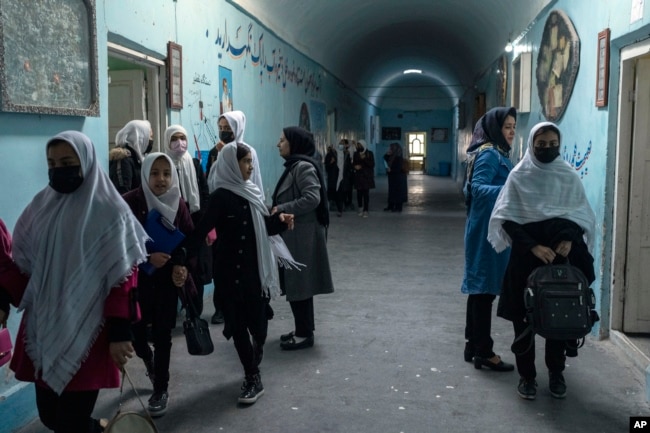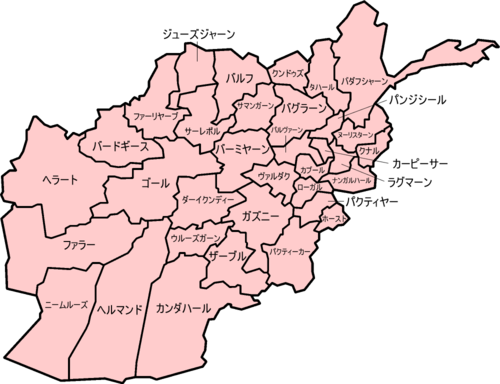年の瀬に、なんとも心が救われるニュースが入りました。
国際社会の声、目が欠かせません。
過酷なアフガニスタンとは全く状況が違いますが、私たちも声を上げなければ、なにも変わらないと強く思います。首相の直接選挙がわたしの主張です。私たちの直接の1票が今の政治を変え、政治に対する関心を高め、政治を信頼しうるものにする方法では?
それはさておき、
早速VOAで英語を学び、世界の今を見つめましょう!!
独自の取り組みでアフガニスタンの州に女子校を再開 (和訳)
Unique Effort Reopens Girls’ School in an Afghan Province
アフガニスタンでは、タリバンの支配者が学校に行くことを許さないため、女子高生はほとんどどこでも家に引きこもっています。
しかし、一つだけ例外があります。
西部のヘラート州では、数週間前から女子高生が高校の教室に戻ってきています。これは、教師や親たちが地元のタリバンの管理者と協力して学校を再開させようとした結果です。
タリバン当局は、再開を公式には承認しませんでした。しかし、10月初旬に授業が始まっても、彼らはそれを止めもしませんでした。
「親、生徒、教師が手を取り合って協力しました」とMohammed Saber Meshaal氏は語っています。彼は、このキャンペーンの開催に協力したヘラートの教師グループの責任者です。
ヘラートでの成功は、現在のタリバンのアフガニスタン支配が、1990年代後半の支配とは異なることを示しています。以前の支配では、タリバンは女性を公共の場から追放し、女子が学校に通うことも認めませんでした。彼らは規則を実施するために力と罰を用いました。
今、タリバンは、自分たちが同じように行動できないことを理解しているようです。過去20年間で、アフガニスタンは変わりました。女性は公共の場に出て、何人かは職業生活を送っています。タリバンは、何が許され、何が許されないのかを明確にしていません。
多くの人は、タリバンが崩壊寸前の経済をコントロールしようとしているときに、さらなる問題を起こしたくないと考えています。タリバンは、国際的な財政支援を失う可能性や、国内での「イスラム国」の危険な成長にも直面しています。
そのため、アフガニスタン人が反撃を試みることのできる狭い道が残されています。

Afghan girls exit classrooms at Tajrobawai Girls High School, in Herat, Afghanistan, Nov. 25, 20212021年11月25日、アフガニスタンのヘラートにあるタジロバワイ女子高校の教室から出るアフガンの少女たち。
8月にタリバンが政権を取ったとき、COVID-19のためにほとんどの学校が閉鎖されました。国際的な圧力を受けて、タリバンはすぐに1年生から6年生までの女子校と、すべてのレベルの男子校を再開しました。
しかし、7年生から12年生までの女子生徒は、”イスラムのやり方”で授業が行われていることを確認しなければならないとして、復帰を許可していません。タリバンはまた、ほとんどの女性が最大の職場である政府の仕事に就くことを禁じています。
しかし、ヘラート州では、教師たちがすぐに組織化を始めました。
「これまでの経緯から、タリバンが来たとき、私たちはとても心配しました」とバシラ・バシラトカ氏は言います。彼女はヘラートのタジロバワイ女子校の校長を務めています。
彼らは、地元のタリバンのリーダーや教育部門の責任者と会い、関係を築いていきました。再開を求めても、タリバンの幹部は、カブールの政府からの命令がなければ許可できないと断っていましたが、先生たちは何度もお願いしたのです。
バシラトカ氏によると、彼らはタリバンに「私たちは何も変える必要はありません。私たちはイスラム教徒であり、イスラム教が要求することはすべて守っています。」話したと言います。
10月までには、先生や親たちは再開できると感じていました。しかし、多くの人が心配していました。この学校に2人の娘を持つ保護者のマストゥラさんは、「不安はありましたし、今もあります。」といいます。「しかし、娘たちは教育を受けなければなりません。教育がなければ、人生は妨げられてしまいます」。

An Afghan girl reads in a classroom next to her teacher at Tajrobawai Girls High School, in Herat, Afghanistan, Nov. 25, 20212021年11月25日、アフガニスタンのヘラートにあるタジロバワイ女子高校の教室で、先生の隣で本を読むアフガンの少女。
学校再開の様子
ファディエ・イスマイルザデさんは、中学3年生の14歳。彼女は、このニュースを聞いて嬉しさのあまり泣いてしまったそうです。「学校が再開されるという希望を失っていました」と彼女は付け加えました。
開校時には、すべての生徒が集まったわけではありませんでした。しかし、親たちが自信を持つようになると、数日後にはクラスがいっぱいになったとバジラートカフさんは言います。
ある日、化学の授業を受けていた女の子たちは、先生が水を構成する元素について説明するのを聞いていました。
シェーベッディン・サケブ氏はヘラート州のタリバンの教育責任者です。彼は、タリバンは女子が学校に行くことに何の問題もないと言います。
「我々は、学校に来るべきだと公言しています」とAP通信に語った。「学校は何の問題もなく開かれています。高校生の女の子が学校に行ってはいけないという公式な命令を出したことはありません。」
国連機関が教師への支払いに同意するには、女子校の完全な再開が必要となるでしょう。これまでのところ、タリバンは再開の時期を決めようとせず、ほとんどの学校は3月まで冬休みに入っています。
タリバンのモハメド・ハッサン・アクンド首相は土曜日の演説で、「女性はすでに教育を受けている」と述べ、「神が許す限り、それを広げる希望はある」とだけ付け加えました。
Unique Effort Reopens Girls’ School in an Afghan Province
High school girls are at staying home almost everywhere in Afghanistan because Taliban rulers will not permit them to go to school.
There is, however, one exception.
For weeks, girls in the western province of Herat have been back in high school classrooms. This comes after an effort by teachers and parents to work with the local Taliban administrators to reopen the schools.
Taliban officials never officially approved the reopening. But they also did not stop it when classes started in early October.
“Parents, students and teachers joined hand in hand to do this,” said Mohammed Saber Meshaal. He is the head of the Herat teachers’ group, which helped organize the campaign.
The success in Herat shows the difference in the Taliban’s current rule over Afghanistan from their rule in the late 1990s. In their earlier rule, the Taliban banned women from public life and would not permit girls to attend school. They used force and punishments to enforce the rules.
Now, the Taliban seem to understand that they cannot act the same way. In the past 20 years, Afghanistan has changed. Women are out in public and some have professional lives. The Taliban have been unclear about what is permitted and what is not permitted.
Many think the Taliban do not want to create additional problems as they try to get control of an economy that is near collapse. The group also faces the possible loss of international financial support and the dangerous growth of the Islamic State in the country.
That has left a narrow path where Afghans can try to push back.
When the Taliban took power in August, most schools were closed because of COVID-19. Following international pressure, the Taliban soon reopened schools for girls in grades 1-6, along with boys’ schools at all levels.
They have not permitted girls in grades 7-12 to return, saying they must be certain the classes are held in an “Islamic manner.” The Taliban also barred most women from government jobs, their largest place of employment.
In Herat province, however, teachers quickly began to organize.
“When the Taliban came, we were very worried, because of everything before,” said Basira Basiratkhah. She is the head of the Tajrobawai Girls School in Herat.
They met with the local Taliban leader and head of the education department to build a relationship. When they asked for a reopening, Taliban officials refused, saying they could not permit it without an order from the government in Kabul. The teachers continued to ask.
Basiratkhah said they told the Taliban, “We don’t need to change anything. We are Muslims and we already observe everything Islam requires.”
By October, the teachers and parents felt they could reopen. But many were worried. “We had concerns, and we have them still,” said Mastoura, a parent with two daughters at the school. “But daughters must get an education. Without education, your life is held back.”
School reopening
Fadieh Ismailzadeh is a 14-year-old in the ninth grade. She said she cried with happiness at the news. “We had lost all hope that schools would reopen,” she added.
Not all the students showed up when the doors opened. But as parents became more confident, classes filled after a few days, Basiratkhah said.
On a recent day, girls in a chemistry class listened as a teacher explained the elements that make up water.
Shehabeddin Saqeb is the Taliban education director for Herat province. He says the group has no problems with girls going to school.
“We openly tell everyone that they should come to school,” he told The Associated Press. “The schools are open without any problem. We never issued any official order saying high-school-aged girls should not go to school.”
A full reopening of girls’ schools must likely happen before United Nations’ agencies will agree to pay teachers. So far, the Taliban have refused to set a date for reopening and most schools are starting a winter break until March.
In a speech Saturday, Taliban Prime Minister Mohammed Hassan Akhund said “women are already getting an education,” adding only: “There is hope to broaden it, as God allows.”
Words in This Story
province - n. any one of the large parts that some countries are divided into
broaden - v. to become wider or more general
アフガニスタンの州
上記リンクより下記抜粋
34 provinces – 421 districts
Afghanistan has a population of 38 million. About 4.5 million people (12 percent of the country) live in the capital Kabul, which is located in the east of the country. Other major provinces include Herat (1.9 million), Nangarhar (1.5 million), Balkh (1.3 million) and Kandahar (1.2 million).
アフガニスタンの人口は3800万人。約450万人(国の12%)が国の東に位置する首都カブールに住んでいます。その他の主要な州としては、ヘラート(190万人)、ナンガルハル(150万人)、バルク(130万人)、カンダハル(120万人)などがあります。

下記、Wikipediaより

上記URLより抜粋
The provinces are administrative units within Afghanistan. Unlike a country’s capital, each province has its own unique characteristics and history, which may vary substantially from region to region. Each province forms part of a larger unit (region) called a maqam, which encompasses a number of sub-regions.
Province(州)は、アフガニスタンにおける行政単位です。国の首都とは異なり、各州には独自の特徴と歴史があり、それは地域によって大きく異なります。各州はマカムと呼ばれる大きな単位(地域)で構成されており、その中にはいくつかのサブ地域があります。
